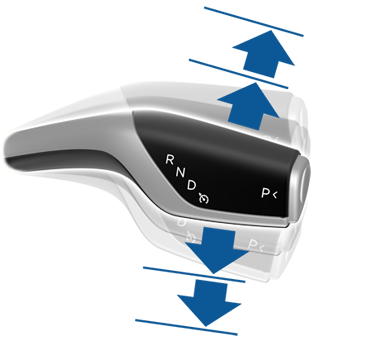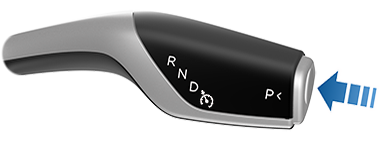Shifting
How to Shift
When Model 3 is in Park, you must press the brake pedal to shift.
Move the drive stalk up or down to shift into different drive modes. A chime sounds whenever you shift gears.

If you try to shift when it is prohibited by the current driving speed, a chime sounds and the drive mode does not change.
If you want to disable chime sounds when you shift gears, touch .
Reverse
Push the drive stalk all the way up and release. You can only shift into Reverse when Model 3 is stopped or moving less than 5 mph (8 km/h).
Neutral
Neutral allows Model 3 to roll freely when you are not pressing the brake pedal:
- When in Park, shift into Neutral by briefly pushing the drive stalk either up or down to the first position.
- When in Drive, shift into Neutral by briefly pushing the drive stalk up to the first position. If Autosteer or Traffic-Aware Cruise Control (if equipped) is active, you must push the drive stalk up to the first position and hold it there for more than 1 second. In doing so, Autosteer or Traffic-Aware Cruise Control is disabled.
- When in Reverse, shift into Neutral by briefly pushing the drive stalk down to the first position.
Model 3 automatically shifts into Park when you leave the driver's seat. To stay in Neutral, use the touchscreen to engage Transport Mode (see Instructions for Transporters).
Drive
Park
Press the end of the drive stalk while Model 3 is stopped.

Model 3 automatically shifts into Park to prevent roll-away while driving in low speeds. This happens whenever you connect a charge cable, unbuckle your seat belt, or open the door while in Drive or Neutral. Ensure the charge cable is removed, buckle your seat belt, and close the door before shifting out of Park.
Attempting to engage the parking brake above 5 mph (8 km/h) will result in emergency braking (see Emergency Braking).
To make it convenient to pick up passengers, you can also unlock all doors at any time by shifting into Park then pressing the Park button a second time.